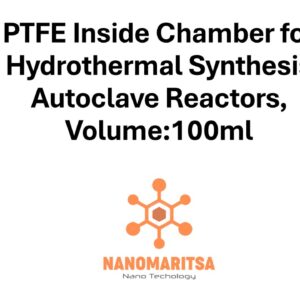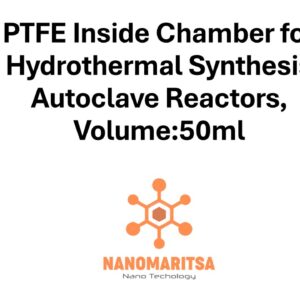Hydrothermal Synthesis Autoclave Reactor with PTFE Lined Vessel 500 ml
€736.00
CompareHydrothermal Synthesis Autoclave Reactor with PTFE Lined Vessel (500 ml) is a specialized laboratory reactor designed to facilitate hydrothermal synthesis reactions, which involve high-temperature and high-pressure conditions in an aqueous environment. This reactor is used for synthesizing materials such as nanoparticles, crystals, and other advanced materials that require these extreme conditions. Below is an overview of its key features, properties, applications, and safety considerations:
1. Key Features:
- Hydrothermal Synthesis: This reactor enables the hydrothermal synthesis method, where materials are synthesized in a water-based solution at elevated temperatures (150°C to 250°C) and high pressures (200-300 bar). It is particularly useful for synthesizing nanomaterials and advanced materials that cannot form under standard conditions.
- PTFE Lined Vessel: The reactor has a vessel lined with PTFE (polytetrafluoroethylene), a highly inert material resistant to many chemicals, acids, and bases. PTFE ensures that the vessel can withstand the aggressive chemical environments often used in hydrothermal reactions without reacting with the materials inside.
- Volume (500 ml): The reactor has a 500 ml capacity, making it suitable for larger-scale reactions. This is beneficial for research or industrial-scale processes where a larger volume of material needs to be synthesized or tested.
- Pressure and Temperature Control: The reactor is built to operate under high-pressure (200-300 bar) and high-temperature conditions, which are critical for hydrothermal reactions. It allows for precise control of reaction conditions, ensuring optimal material formation.
- Safety Features: The reactor is designed with built-in safety mechanisms to handle high pressures and temperatures, reducing the risk of accidents. The PTFE lining also helps to minimize the risk of leaks or contamination.
2. Properties:
- Chemical Inertness: The PTFE lining prevents unwanted reactions between the reactor walls and the reactants. PTFE is chemically inert and non-stick, making it ideal for reactions involving aggressive chemicals.
- Temperature and Pressure Resistance: The reactor can safely withstand high temperatures (typically up to 250°C) and high pressures (200-300 bar), which are essential for conducting hydrothermal reactions effectively.
- Uniform Reaction Environment: The sealed reactor environment ensures uniform temperature and pressure conditions, promoting consistent material synthesis with controlled properties.
- Versatility: The reactor can handle a wide range of chemical reactions, from crystal growth to nanoparticle synthesis, making it versatile for various research and industrial applications.
3. Applications:
- Nanomaterial Synthesis: The reactor is commonly used to synthesize nanoparticles and nanomaterials, which are widely used in fields such as electronics, energy storage, and catalysis.
- Crystal Growth: It is ideal for growing high-quality single or polycrystals of inorganic compounds, including metal oxides, semiconductors, and other advanced materials.
- Catalysis and Chemical Reactions: The reactor is suitable for synthesizing catalytic materials or carrying out chemical reactions that require high temperature and pressure to achieve desired product properties.
- Energy Materials: Hydrothermal synthesis is frequently used in the preparation of materials for energy storage, such as lithium-ion battery anodes, supercapacitors, and fuel cells.
- Environmental Research: The reactor can be used for the synthesis of materials designed for environmental remediation, such as catalysts for pollution control or materials for water purification.
- Advanced Ceramics and Composites: The reactor is useful for producing high-performance ceramics and composite materials for applications in sensors, coatings, and electronic devices.
4. Handling and Safety:
- Toxicity and Corrosiveness: The PTFE lining ensures that the reactor can withstand aggressive chemicals, but care should still be taken to ensure that the reactants are compatible with the materials used in the reactor. Some substances may still pose toxicity risks, so appropriate safety measures should be followed.
- Pressure and Temperature Safety: As the reactor operates under high pressure and temperature, it is critical to follow the manufacturer’s guidelines and safety instructions. The reactor should be inspected regularly for wear and damage to seals and gaskets.
- Storage: After use, the reactor should be stored in a cool, dry place, away from direct sunlight or temperature extremes. Clean the reactor thoroughly after each use to prevent any chemical residue buildup or contamination.
- Precautions: Always wear appropriate personal protective equipment (PPE), such as gloves, goggles, and lab coats, when handling the reactor. It is advisable to work in a fume hood or well-ventilated area to minimize exposure to vapors or fumes generated during reactions.
Summary:
The 500 ml Hydrothermal Synthesis Autoclave Reactor with PTFE Lined Vessel is a highly versatile and reliable tool for conducting high-temperature, high-pressure reactions in laboratories and research settings. Its large volume makes it suitable for producing larger quantities of synthesized materials, while the PTFE lining ensures chemical compatibility and resistance to corrosion. This reactor is ideal for applications in nanomaterial synthesis, crystal growth, catalysis, energy storage, and environmental research. With its robust design, it provides an effective solution for research and industrial processes that require precise control over reaction conditions.
| Pieces | 1 Piece, 5 Pieces |
|---|






